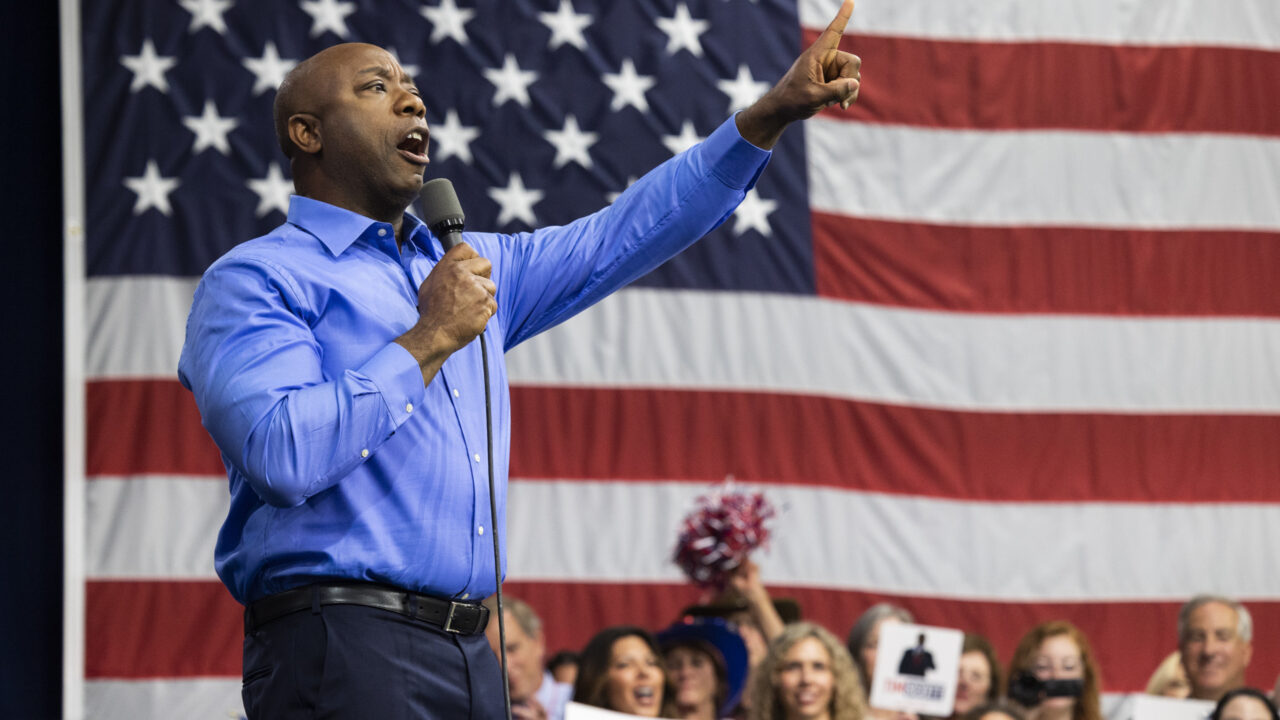Why Ron DeSantis is not the most consequential Trump challenger in the US presidential race
All eyes are on the competition between DeSantis and Trump. But Tim Scott may be the one to watch
The Florida governor Ron DeSantis has finally announced his long-awaited presidential bid through a live conversation with Elon Musk on Twitter, only two days after Tim Scott, the Republican senator from South Carolina, announced his own campaign. While the media focus in this primary has been on the duel between the front-runners Trump and DeSantis, Scott – despite entering the race with only 2 per cent in the polls – may prove more consequential to the presidential contest and the future of the GOP than DeSantis.
This has to do with Scott’s and DeSantis’s personal stories and, as with everything else in the GOP, with how the two candidates relate to Trump. For while DeSantis is struggling to compete with the former president in style and substance, Scott could ultimately be the perfect vice-presidential candidate for Trump.
Scott and DeSantis both embrace the role of conservative culture warriors fighting the progressive left. But their styles are completely different, and their distinct profiles allow them to fight the culture wars in a very different way.
DeSantis has based his culture warrior credentials on his legislative accomplishments in Florida: fighting the “woke” in education, especially on issues of sexual identity and race, banning abortions after six weeks, and cracking down on Disney for its embrace of the LGBTQ agenda. The abortion ban in particular will make it difficult to broaden his appeal to swing voters in the election.
Scott, on the other hand, appeals to the Republican base with his conservative values but is also able to engage a broader spectrum of voters. He is pushing his own version of the Republican anti-wokeness narrative: a black man who claims America is not racist and that he is the living proof of that. While DeSantis holds speeches about the importance of fathers in raising children, Scott reportedly joined the Women’s Caucus – a bipartisan organisation in the House of Representatives committed to advancing women’s rights in Congress – during his term in the South Carolina Senate, on the grounds of being “the product of a powerful single mother”. While DeSantis tours the country in private jets, and seems uncomfortable interacting with journalists and ordinary folk, Scott likes to ride buses incognito, saying that it is “easy to have a polite conversation with a US senator, but you can have a real conversation with the dude on the bus”.
Scott’s personal story also allows him to manage Trump in a manner that DeSantis cannot. DeSantis has so far been unable to build a profile that goes beyond presenting himself as a younger and less scandalous version of Trump who is a “proven winner”. He is the public enemy number one of the former president, who portrays him as a traitor of the cause. And he has progressively fallen behind Trump in the polls.
Scott is a breath of fresh air for the Republicans: a non-grievance candidate who is not trying to replicate Trump
By contrast, Scott is a breath of fresh air for the Republicans: a non-grievance candidate who is not trying to replicate Trump. His personal story – a descendant of slaves, raised by a single mother and an illiterate grandfather, who managed to become the first black Republican senator – is so unique that he does not need to explicitly distinguish himself from Trump. And beyond his critique of Trump’s comments playing down the rally by white supremacists in Charlottesville, he has not criticised the former president on any of his policy accomplishments, and has been quiet on the January 6 insurrection.
The only elephant in the room is: can a black man win a Republican nomination? Scott did not have to compete in the Republican primary for the Senate seat in South Carolina – he was appointed by former governor Nikki Haley to replace senator Jim DeMint who went on to head the Heritage Foundation think-tank. But although the base is untested on the question of race, Scott carries a strong appeal both for elite Republicans and black voters and moderates, making him the perfect vice-president pick.
Charismatic, staunchly religious, traditionally conservative, with a track record of bipartisan achievements, Scott is a Republican with strong potential to capture critical votes in the presidential election. He carries the electability card, not DeSantis.
The European Council on Foreign Relations does not take collective positions. ECFR publications only represent the views of their individual authors.



